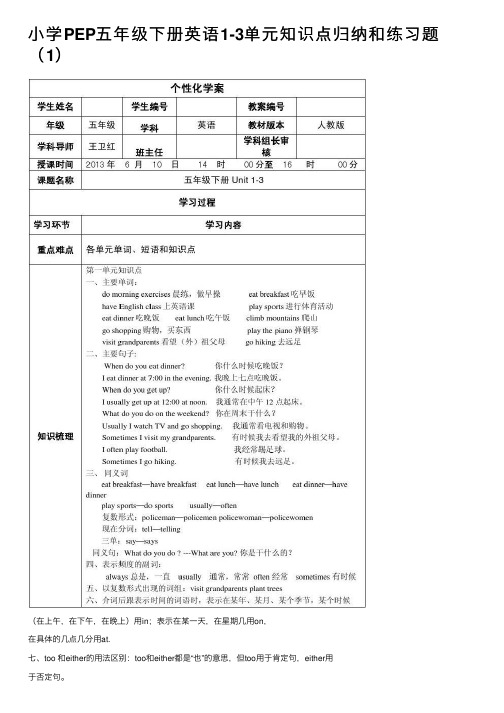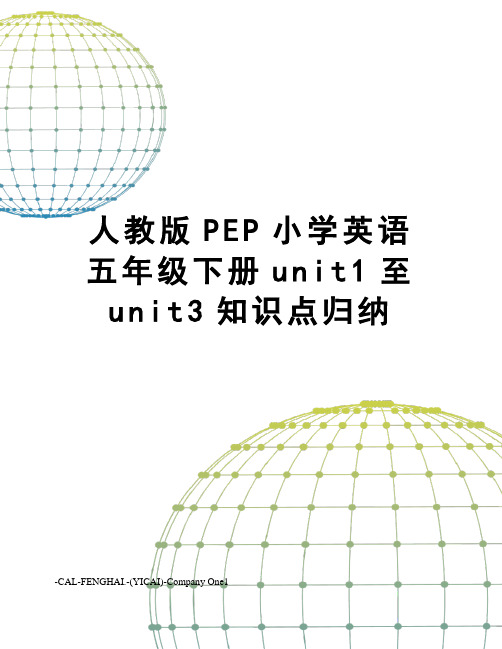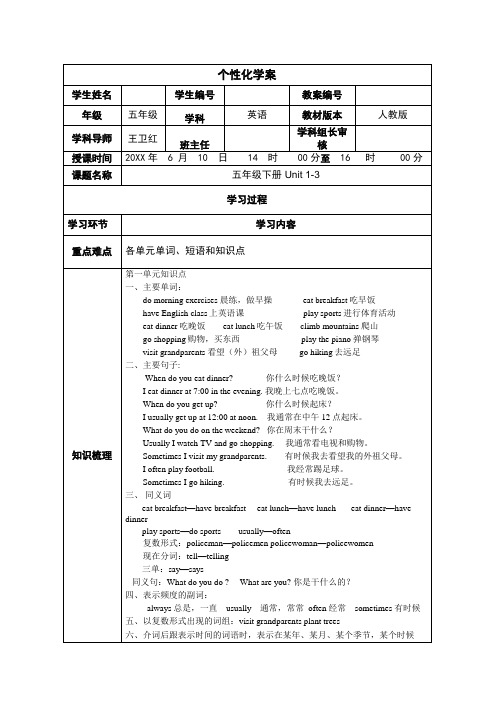小学PEP五年级下册英语1-3单元知识点归纳和练习题 (1)
小学PEP五年级下册英语1-3单元知识点归纳和练习题(1)

⼩学PEP五年级下册英语1-3单元知识点归纳和练习题(1)(在上午,在下午,在晚上)⽤in;表⽰在某⼀天,在星期⼏⽤on,在具体的⼏点⼏分⽤at.七、too 和either的⽤法区别:too和either都是“也”的意思,但too⽤于肯定句,either⽤于否定句。
第⼆单元知识点⼀、主要单词:season季节 spring春天summer夏天fall冬天winter冬天swim游泳fly kites放风筝skate滑冰 make a snowman堆雪⼈plant trees 种树⼆、主要句⼦:Which season do you like best? 你最喜欢哪个季节?I like winter best. 我最喜欢冬天。
Summer is good, but fall is my favorite season。
夏天是很好,但是冬天是我最喜爱的季节。
Why do you like summer?你为什么喜欢夏天?Because I can swim in the lake. 因为我可以在湖⾥游泳。
Why do you like winter?你为什么喜欢冬天?Because I can sleep a long time.因为我可以睡很长时间的觉。
三、同义词:autumn—fall三单:say—says ask—asks come—comes对应词:wake up—sleep go to bed—get up同义句:What’s your favourite season?(你最喜爱的季节是什么?)----Which season do you like best?(你最哪个季节?)四、play with 玩雪,play in the snow在雪中玩 . 如果在横线后⾯有the ,则选择in ,如果在横线后⾯没有the , 则选择 with.五、like后⾯不能直接跟动词。
如果需要跟动词或动词性词组时,则需在like后⾯加to. 如果不加to. 就要把后⾯的动词变成相应的动名词形式. 如:I like to swim ===I likeswimming.六、当表⽰某地某个季节的天⽓情况时,要把季节放在前⾯,地点放在后⾯。
小学PEP五年级下册英语1-3单元知识点归纳和练习题

(在上午,在下午,在晚上)用in;表示在某一天,在星期几用on,在具体的几点几分用at.七、too 和either的用法区别:too和either都是“也”的意思,但too用于肯定句,either用于否定句。
第二单元知识点一、主要单词:season季节 spring春天summer夏天fall冬天winter冬天swim游泳fly kites放风筝skate滑冰 make a snowman堆雪人plant trees 种树二、主要句子:Which season do you like best? 你最喜欢哪个季节?I like winter best. 我最喜欢冬天。
Summer is good, but fall is my favourite season。
夏天是很好,但是冬天是我最喜爱的季节。
Why do you like summer?你为什么喜欢夏天?Because I can swim in the lake. 因为我可以在湖里游泳。
Why do you like winter?你为什么喜欢冬天?Because I can sleep a long time.因为我可以睡很长时间的觉。
三、同义词:autumn—fall三单:say—says ask—asks come—comes对应词:wake up—sleep go to bed—get up同义句:What’s your favourite season?(你最喜爱的季节是什么?)----Which season do you like best?(你最哪个季节?)四、play with 玩雪,play in the snow在雪中玩 . 如果在横线后面有the ,则选择in ,如果在横线后面没有the , 则选择 with.五、like后面不能直接跟动词。
如果需要跟动词或动词性词组时,则需在like后面加to. 如果不加to. 就要把后面的动词变成相应的动名词形式. 如:I like to swim ===I likeswimming.六、当表示某地某个季节的天气情况时,要把季节放在前面,地点放在后面。
人教版PEP小学英语五年级下册unit1至unit3知识点归纳

五年级下册Unit 1-3重点难点、单元单词、短语和知识点知识梳理第一单元知识点一、主要单词:do morning exercises晨练,做早操 eat breakfast吃早饭 have English class上英语课 play sports进行体育活动 eat dinner吃晚饭 eat lunch 吃午饭 climb mountains爬山 go shopping购物,买东西 play the piano 弹钢琴 visit grandparents看望(外)祖父母 go hiking去远足二、主要句子:When do you eat dinner你什么时候吃晚饭I eat dinner at 7:00 in the evening.我晚上七点吃晚饭。
When do you get up你什么时候起床I usually get up at 12:00 at noon.我通常在中午12点起床。
What do you do on the weekend你在周末干什么Usually I watch TV and go shopping.我通常看电视和购物。
Sometimes I visit my grandparents.有时候我去看望我的外祖父母。
I often play football.我经常踢足球。
Sometimes I go hiking.有时候我去远足。
三、同义词eat breakfast—have breakfast eat lunch—have luncheat dinner—have dinner play sports—do sports usually—often复数形式:policeman—policemen policewoman—policewomen现在分词:tell—telling三单:say—says同义句:What do you do ---What are you你是干什么的四、表示频度的副词:always总是,一直 usually通常,常常 often经常 sometimes有时候五、以复数形式出现的词组:visit grandparents plant trees介词后跟表示时间的词语时,表示在某年、某月、某个季节,某个时候(在上午,在下午,在晚上)用in;表示在某一天,在星期几用on,在具体的几点几分用at.七、too 和either的用法区别:too和either都是“也”的意思,但too用于肯定句,either用于否定句。
最新人教版PEP小学英语五年级下册unit1至unit3知识点归纳

五年级下册Unit 1-3重点难点、单元单词、短语和知识点知识梳理第一单元知识点一、主要单词:do morning exercises晨练,做早操 eat breakfast吃早饭 have English class上英语课 play sports进行体育活动 eat dinner吃晚饭 eat lunch 吃午饭 climb mountains爬山 go shopping购物,买东西 play the piano 弹钢琴 visit grandparents看望(外)祖父母 go hiking去远足二、主要句子:When do you eat dinner?你什么时候吃晚饭?I eat dinner at 7:00 in the evening.我晚上七点吃晚饭。
When do you get up?你什么时候起床?I usually get up at 12:00 at noon.我通常在中午12点起床。
What do you do on the weekend?你在周末干什么?Usually I watch TV and go shopping.我通常看电视和购物。
Sometimes I visit my grandparents.有时候我去看望我的外祖父母。
I often play football.我经常踢足球。
Sometimes I go hiking.有时候我去远足。
三、同义词eat breakfast—have breakfast eat lunch—have luncheat dinner—have dinner play sports—do sports usually—often复数形式:policeman—policemen policewoman—policewomen现在分词:tell—telling三单:say—says同义句:What do you do ? ---What are you?你是干什么的?四、表示频度的副词:always总是,一直 usually通常,常常 often经常 sometimes有时候五、以复数形式出现的词组:visit grandparents plant trees介词后跟表示时间的词语时,表示在某年、某月、某个季节,某个时候(在上午,在下午,在晚上)用in;表示在某一天,在星期几用on,在具体的几点几分用at.七、too 和either的用法区别:too和either都是“也”的意思,但too用于肯定句,either用于否定句。
人教版PEP小学英语五年级下册unit1至unit3知识点归纳

人教版P E P小学英语五年级下册u n i t1至u n i t3知识点归纳-CAL-FENGHAI.-(YICAI)-Company One1五年级下册Unit 1-3重点难点、单元单词、短语和知识点知识梳理第一单元知识点一、主要单词:do morning exercises晨练,做早操 eat breakfast吃早饭 have English class上英语课 play sports进行体育活动 eat dinner吃晚饭 eat lunch吃午饭 climb mountains爬山 go shopping购物,买东西 play the piano弹钢琴 visit grandparents看望(外)祖父母 go hiking去远足二、主要句子:When do you eat dinner你什么时候吃晚饭I eat dinner at 7:00 in the evening.我晚上七点吃晚饭。
When do you get up你什么时候起床I usually get up at 12:00 at noon.我通常在中午12点起床。
What do you do on the weekend你在周末干什么Usually I watch TV and go shopping.我通常看电视和购物。
Sometimes I visit my grandparents.有时候我去看望我的外祖父母。
I often play football.我经常踢足球。
Sometimes I go hiking.有时候我去远足。
三、同义词eat breakfast—have breakfast eat lunch—have luncheat dinner—have dinner play sports—do sports usually—often复数形式:policeman—policemen policewoman—policewomen现在分词:tell—telling三单:say—says同义句:What do you do ---What are you你是干什么的四、表示频度的副词:always总是,一直 usually通常,常常 often经常 sometimes有时候五、以复数形式出现的词组:visit grandparents plant trees介词后跟表示时间的词语时,表示在某年、某月、某个季节,某个时候(在上午,在下午,在晚上)用in;表示在某一天,在星期几用on,在具体的几点几分用at.七、too 和either的用法区别:too和either都是“也”的意思,但too用于肯定句,either用于否定句。
小学PEP五年级下册英语1-3单元知识点归纳和练习题

小学PEP五年级下册英语1-3单元知识点归纳和练习题1(在上午,在下午,在晚上)用in;表示在某一天,在星期几用on,在具体的几点几分用at.七、too 和either的用法区别:too和either都是“也”的意思,但too用于肯定句,either用于否定句。
第二单元知识点一、主要单词:season季节 spring春天 summer夏天 fall冬天winter冬天swim游泳 fly kites 放风筝 skate滑冰 make a snowman堆雪人 plant trees种树二、主要句子:Which season do you like best? 你最喜欢哪个季节,I like winter best. 我最喜欢冬天。
Summer is good, but fall is my favourite season。
夏天是很好,但是冬天是我最喜爱的季节。
Why do you like summer? 你为什么喜欢夏天,Because I can swim in the lake. 因为我可以在湖里游泳。
Why do you like winter? 你为什么喜欢冬天,Because I can sleep a long time. 因为我可以睡很长时间的觉。
三、同义词:autumn—fall三单:say—says ask—asks come—comes对应词:wake up—sleep go to bed—get up同义句:What’s your favourite season?(你最喜爱的季节是什么,)----Which season do you like best?(你最哪个季节,)四、play with 玩雪,play in the snow在雪中玩 . 如果在横线后面有the ,则选择in , 如果在横线后面没有the , 则选择 with.五、like后面不能直接跟动词。
小学PEP五年级下册英语1-3单元知识点归纳和练习题

七、too 和either 的用法区别:too 和either 都是“也”的意思,但too 用于肯定句,either 用于否定句。
第二单元知识点一、主要单词:season 季节 spring 春天 summer 夏天 fall 冬天winter 冬天swim 游泳 fly kites 放风筝skate 滑冰 make a snowman 堆雪人 plant trees 种树二、主要句子:Which season do you like best? 你最喜欢哪个季节?I like winter best. 我最喜欢冬天。
Summer is good, but fall is my favourite season 。
夏天是很好,但是冬天是我最喜爱的季节。
Why do you like summer? 你为什么喜欢夏天?Because I can swim in the lake. 因为我可以在湖里游泳。
Why do you like winter? 你为什么喜欢冬天?Because I can sleep a long time. 因为我可以睡很长时间的觉。
三、同义词:autumn —fall三单:say —says ask —asks come —comes对应词:wake up —sleep go to bed —get up同义句:What’s your favourite season?(你最喜爱的季节是什么?)----Which season do you like best?(你最哪个季节?)四、play with 玩雪,play in the snow 在雪中玩 . 如果在横线后面有the ,则选择in , 如果在横线后面没有the , 则选择 with.五、like 后面不能直接跟动词。
如果需要跟动词或动词性词组时,则需在like 后面加to. 如果不加to. 就要把后面的动词变成相应的动名词形式. 如:I like to swim ===I likeswimming.六、当表示某地某个季节的天气情况时,要把季节放在前面,地点放在后面。
小学PEP五年级下册英语1-3单元知识点归纳和练习题

七、too 和either 的用法区别:too 和either 都是“也”的意思,但too 用于肯定句,either 用于否定句。
第二单元知识点一、主要单词:season 季节 spring 春天 summer 夏天 fall 冬天winter 冬天swim 游泳 fly kites 放风筝skate 滑冰 make a snowman 堆雪人 plant trees 种树二、主要句子:Which season do you like best? 你最喜欢哪个季节?I like winter best. 我最喜欢冬天。
Summer is good, but fall is my favourite season 。
夏天是很好,但是冬天是我最喜爱的季节。
Why do you like summer? 你为什么喜欢夏天?Because I can swim in the lake. 因为我可以在湖里游泳。
Why do you like winter? 你为什么喜欢冬天?Because I can sleep a long time. 因为我可以睡很长时间的觉。
三、同义词:autumn —fall三单:say —says ask —asks come —comes对应词:wake up —sleep go to bed —get up同义句:What’s your favourite season?(你最喜爱的季节是什么?)----Which season do you like best?(你最哪个季节?)四、play with 玩雪,play in the snow 在雪中玩 . 如果在横线后面有the ,则选择in , 如果在横线后面没有the , 则选择 with.五、like 后面不能直接跟动词。
如果需要跟动词或动词性词组时,则需在like 后面加to. 如果不加to. 就要把后面的动词变成相应的动名词形式. 如:I like to swim ===I likeswimming.六、当表示某地某个季节的天气情况时,要把季节放在前面,地点放在后面。
2022年人教版PEP小学英语五年级下册unit1至unit3知识点归纳

五年级下册Unit 1-3重点难点、单元单词、短语和知识点知识梳理第一单元知识点一、重要单词:do morning exercises晨练,做早操eat breakfast吃早饭have English class上英语课play sports进行体育活动eat dinner吃晚饭eat lunch吃午饭climb mountains爬山go shopping购物,买东西play the piano弹钢琴visit grandparents看望(外)祖父母go hiking去远足二、重要句子:When do you eat dinner?你什么时候吃晚饭?I eat dinner at 7:00 in the evening.我晚上七点吃晚饭。
When do you get up?你什么时候起床?I usually get up at 12:00 at noon.我一般在中午12点起床。
What do you do on the weekend?你在周末干什么?Usually I watch TV and go shopping.我一般看电视和购物。
Sometimes I visit my grandparents.有时候我去看望我旳外祖父母。
I often play football.我常常踢足球。
Sometimes I go hiking.有时候我去远足。
三、同义词eat breakfast—have breakfast eat lunch—have luncheat dinner—have dinner play sports—do sports usually—often复数形式:policeman—policemen policewoman—policewomen目前分词:tell—telling三单:say—says同义句:What do you do ? ---What are you?你是干什么旳?四、表达频度旳副词:always总是,一直usually一般,常常often常常sometimes有时候五、以复数形式出现旳词组:visit grandparents plant trees介词后跟表达时间旳词语时,表达在某年、某月、某个季节,某个时候(在上午,在下午,在晚上)用in;表达在某一天,在星期几用on,在详细旳几点几分用at.七、too 和either旳使用办法区别:too和either都是“也”旳意思,但too用于肯定句,either用于否认句。
- 1、下载文档前请自行甄别文档内容的完整性,平台不提供额外的编辑、内容补充、找答案等附加服务。
- 2、"仅部分预览"的文档,不可在线预览部分如存在完整性等问题,可反馈申请退款(可完整预览的文档不适用该条件!)。
- 3、如文档侵犯您的权益,请联系客服反馈,我们会尽快为您处理(人工客服工作时间:9:00-18:30)。
(在上午,在下午,在晚上)用in;表示在某一天,在星期几用on,在具体的几点几分用at.七、too 和either的用法区别:too和either都是“也”的意思,但too用于肯定句,either用于否定句。
第二单元知识点一、主要单词:season季节 spring春天summer夏天fall冬天winter冬天swim游泳fly kites放风筝skate滑冰 make a snowman堆雪人plant trees 种树二、主要句子:Which season do you like best? 你最喜欢哪个季节?I like winter best. 我最喜欢冬天。
Summer is good, but fall is my favorite season。
夏天是很好,但是冬天是我最喜爱的季节。
Why do you like summer?你为什么喜欢夏天?Because I can swim in the lake. 因为我可以在湖里游泳。
Why do you like winter?你为什么喜欢冬天?Because I can sleep a long time.因为我可以睡很长时间的觉。
三、同义词:autumn—fall三单:say—says ask—asks come—comes对应词:wake up—sleep go to bed—get up同义句:What’s your favourite season?(你最喜爱的季节是什么?)----Which season do you like best?(你最哪个季节?)四、play with 玩雪,play in the snow在雪中玩 . 如果在横线后面有the ,则选择in ,如果在横线后面没有the , 则选择 with.五、like后面不能直接跟动词。
如果需要跟动词或动词性词组时,则需在like后面加to. 如果不加to. 就要把后面的动词变成相应的动名词形式. 如:I like to swim ===I likeswimming.六、当表示某地某个季节的天气情况时,要把季节放在前面,地点放在后面。
其结构为:What’s the weather like in 季节in 地点?第三单元知识点一、主要单词:January (Jan.) February (Feb.) March (Mar.) April(Apr.) May June July August(Aug.) September(Sept.) October( Oct.) November (Nov.) December ( Dec.)二、主要句子1. When is your birthday?你的生日是什么时候It’s in May. 在五月。
2. My birthday is in June. Uncle Bill’s birthday is in June, too.我的生日在六月。
比尔叔叔的生日也在六月。
3. Is her birthday in June? 她的生日在六月吗?Yes.是的。
4.What’s the date?今天是几月几日?June 9th .六月九日。
5. What’s the date today?今天是几月几日?It’s April 10th. 四月十日。
6.句子:How many birthdays are in October ?有几个人的生日在十月? There are 3.三、主要知识点:1、关于月份:(1)五月May , 六月June, 七月July,没有简写形式。
九月September 的简写形式是前四个字母加点Sept.其他八个月的简写形式是前三个字母加点。
(2)无论是完全形式还是简写形式,表示12个月的单词的第一个字母都要大写。
2、关于基数词变序数词。
(1)一般情况下,直接在基数词后面加th. (one , two , three 除外)。
one—first , two—second , three—third .(2) 以ve结尾的基数词,变ve为f, 再加th. 如:five—fifth , twelve—twelfth.(3)以t结尾的基数词,直接加h。
如eight—eighth.(4) 以不发音的字母e结尾的,丢掉不发音的字母e,再加th.如nine—ninth.(5)以y结尾的整十数,在变为序数词时,将y变为ie,再加th.如twenty—twentieth . (6)20以上的两位数,变为序数词时,十位数不变,只将个位上的数变为序数词。
如:twenty- one----twenty-first , twenty-two—twenty-second , thirty-four—thirty-fourth . (7)序数词的简写形式为表示该词的阿拉伯数字加上该单词的最后两个字母,最后两个字母要变成上标格式。
如:first—1st , second—2nd , third—3rd , fourth—4th . twentieth—20th 3. 在回答When is your birthday?这个问题时,如果只说明生日在几月份,在月份前用in.如My birthday is in July. 如果要具体说明生日是在几月几日,则要把in去掉,直接用is,或者在is后加on。
如My birthday is June 9th. 或My birthday is on June 9th .4.注意区分两个句子:What day is it today ?今天星期几?What’s the date today? 今天是几月几日?5. 根据要求写单词: make (现在分词)---making. send( 现在分词)---sending.7. My birthday is in February .(变为一般疑问句)---Is your birthday in February?8. Does she have a computer?她有计算机吗?当第三人称单数和句子中出现了does时,其他动词必须使用原型。
9、读序数词时,前面一定要加the. 如 October 1st .读作October the first.10、同义句:Who has a birthday in October?===Whose birthday is in October?五年级英语下册期末综合练习(PEP)一、选择题。
( ) 1. I play _____ piano every day. A. a B. the C. an( ) 2. _____ do you eat dinner? At 6:00p.m. A. What B. When C. Where( ) 3. I play football _____ the weekend. A. in B. at C. on( ) 4. _____ season do you like best? A. When B. What’s C. Which( ) 5. I can play _____ snow in winter. A. with B. the C. in( ) 6. I am sending Grandma ____ e-card. A. a B. an C. some( ) 7. They often swim _____ August. A. in B. on C. at( ) 8. The _____ day of a week is Monday. A. first B. second C. third( ) 9. _____ book is on the desk. A. She’s B. She C. Her( ) 10. _____ she have a computer? A. Do B. Does C. Is( ) 11. John is ______ dinner. A. eat B. eating C. eats( ) 12. I ______ books at nine every evening.A. readB. readingC. am reading( ) 13. _____ is your father? He’s in the kitchen. A. Where B. When C. What( ) 14. Dad, there’s a call _____ you. A. for B. on C. to( ) 15. How’s everybody _______? A. do B. doing C. does( ) 16. What _____ the koalas doing? A. is B. are C. do( ) 17. Look! The kangaroo ________. A. is jumping B. jumps C. jumping( ) 18. The mother elephant isn’t _____. A. walk B. walking C. to walk( ) 19. ______ many birds in the sky. A. There is B. There are C. There have( ) 20. Can the pandas ______? A. swimming B. swim C. are swimming( ) 21. Are you ______ fish? A. watch B. watching C. watches( ) 22. Do you see _____ animals? A. some B. any C. one( ) 23. The fish are _____ in the river. A. swiming B. swimming C. swim( ) 24. I want to _____ . A. have a picnic B. having a picnic C. has a picnic( ) 25. Wu Yifan is counting ______. A. leaves B. leaf C. leafs二、情景选择。
( ) 1.如果你想了解别人是干什么的,你可以问:A. Who are you?B. What do you like?C. What do you do?( ) 2. 你在问别人问题之前,你可以有礼貌地说:A. I’m sorry.B. Excuse me.C. Can you help me?( ) 3. 别人对你表示感谢,你可以回答:A. You’re welcome.B. Don’t thank me.C. All right.( ) 4. 如果你想了解别人最喜欢吃什么,你可以问:A. What do you like?B. What’s your favourite food?C. Do you like th is? ( ) 5. 如果你想了解今天的天气怎么样,你可以问:A. What day is it today?B. What time is it?C. What’s the weather like today? ( ) 6. 如果你想了解今天是几月几日,你应该问:A. What is the date today?B. What day is it today?C. What is it?( ) 7. 如果你想问别人会做什么,你可以问:A. What do you do?B. What are you doing?C. What can you do?( ) 8. 如果你想了解别人的房间是怎么样的,你可以问:、What’s your room? B. What’s your room like? C. Where’s your room?( ) 9. 妈妈称赞你说:You’re so helpful,你应该回答:A. You’re welcome.B. I’m not helpful.C. Thank you.( ) 10. 如果你想问别人星期一上什么课,你可以问:A. What do you do on Monday?B. What would you like on Monday?What do you have on Mondays?( ) 11.打电话时如果想知道对方是谁,应该问:A. Who are you?B. Who’s that?C. Who’s this?( ) 12. 在电话中介绍自己似乎谁,你可以说:A. I am Peter.B. My name is Peter.C. This is Peter.( ) 13. 如果你想和李先生通电话,你可以说:Hello. May I speak to Mr. Li? B. Where is Mr. Li, please?Who is Mr. Li?( ) 14. 如果你想了解对方在做什么,你可以问:A. What are you?B. Where are you?C. What are you doing?( ) 15. 如果你想了解别人爸爸的身体情况,你可以问:A. How is your father?B. What is your father doing?C. What is your father? ( ) 16.如果你想夸那个男孩很可爱,你可以说:A. The boy is kind.B. The boy is active.C. The boy is cute.( ) 17. 如果你想问他们经常做什么,你可以问:A. What do they often do?B. What are they doing?C. What can they do? ( ) 18. 如果你想问别人借故事书,你可以问:A. Where is your story-book?B. May I have a look at your story-book?I want to read a story-book.( ) 19. 如果你想要别人描述一下校长的样子,你可以说:A. Who’s your principal?B. What’s your principal?What’s your principal like?( ) 20. 如果你想问别人几点起床,你可以问:A. What time do you get up?B. Why do you get up?C. How do you get up?( ) 21. 如果你想了解John在做什么,你应该问:A. What can John do?B. What is John doing?C. What does John do?( ) 22. 如果你想要别人告诉你,你可以说:A. May you speak to me?B. Say me.C. Tell me, please.( ) 23. 如果你告诉别人到了走的时间了,你应该说:A. Let’s go.B. Can you go now?C. It’s time to go.( ) 24. 你告诉别人你正过来,你应该说:A. I’m coming.B. I am here.C. Let me come.( ) 25. 你让别人过来看一看,你可以说:A. Let me see.B. You can see.C. Come and have a look三、根据中文提示填空。
